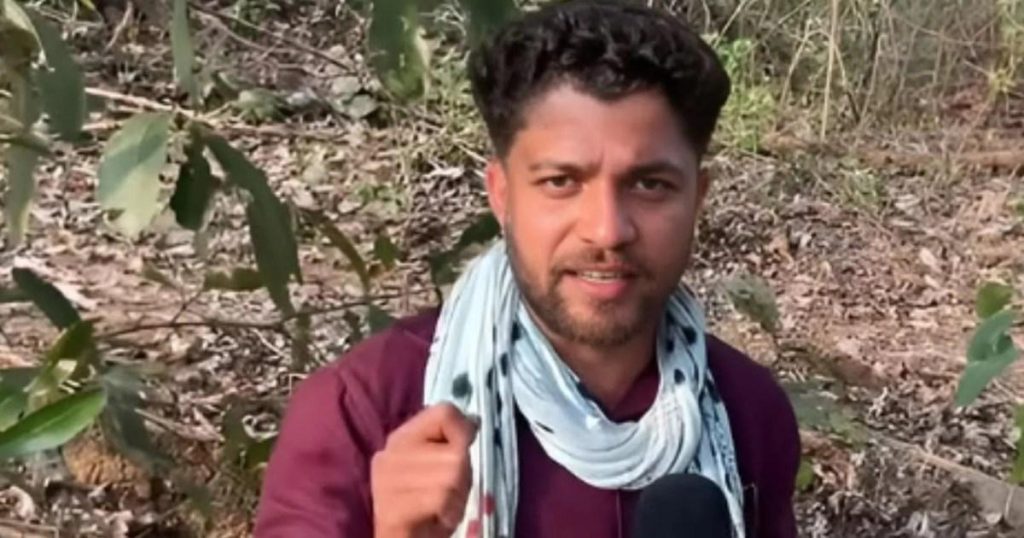The Brutal Murder of Mukesh Chandrakar: An Investigative Journalist Silenced in India
Mukesh Chandrakar, a 28-year-old investigative journalist from India, met a gruesome end, his body discovered in a septic tank, bearing the marks of a brutal assault. The autopsy revealed a horrifying catalogue of injuries: fifteen fractures to his head and ribs, a broken neck, and the chilling detail that his heart had been ripped out and his liver cut into pieces. This horrific discovery sent shockwaves through the journalistic community and raised serious concerns about the safety of journalists in India, a country already grappling with a tarnished reputation for press freedom. The brutality of the crime underscored the risks faced by those who dare to expose corruption and wrongdoing, particularly in sensitive sectors like the construction industry.
Mukesh’s work focused on exposing corruption within the construction industry, a sector rife with irregularities and often linked to powerful individuals. He worked with Bastar Junction, a popular YouTube channel known for its investigative reports on issues affecting local communities. One of Mukesh’s recent investigations had uncovered alleged corruption in a construction project in Bijapur, the very town where his body was discovered. This report, which brought to light potential financial improprieties, is now considered a possible motive for his murder. The fact that three of the four individuals arrested in connection with the crime are Mukesh’s relatives adds another layer of complexity to the case, raising questions about potential internal conflicts and the extent of the conspiracy to silence him.
The discovery of Mukesh’s body followed a missing person report filed by his brother on New Year’s Day. His brother’s suspicions were aroused when Mukesh’s phone remained switched off after a meeting at a building contractor’s property. Police, tracking the phone’s signal, located it at the contractor’s compound in Bijapur. The gruesome discovery within the septic tank, concealed beneath a layer of cement, highlighted the perpetrators’ attempts to hide their crime and prevent identification. The tattoo on Mukesh’s hand served as the only means of positive identification, a grim testament to the brutality he endured.
The murder of Mukesh Chandrakar has drawn sharp condemnation from press freedom organizations and government officials. The Press Council of India expressed grave concern and demanded a thorough investigation into the circumstances surrounding his death. Chhattisgarh Chief Minister Vishnu Deo Sai described the killing as "heartbreaking" and pledged to ensure the perpetrators receive the "harshest punishment". These statements, while offering assurances of justice, also highlight the broader issue of press freedom in India. The country’s ranking of 159 out of 180 countries in the 2024 World Press Freedom Index paints a bleak picture of the environment in which journalists operate, often facing intimidation, violence, and even death for their work.
This tragic incident underscores the vulnerability of journalists who expose corruption and challenge powerful interests. Mukesh’s dedication to uncovering the truth, even in the face of potential danger, highlights the importance of investigative journalism in holding those in power accountable. His murder serves as a stark reminder of the risks journalists face globally, particularly in countries where corruption is rampant and impunity for crimes against journalists is prevalent. The case also raises questions about the effectiveness of mechanisms designed to protect journalists and the need for stronger measures to ensure their safety.
The investigation into Mukesh Chandrakar’s murder continues, with authorities working to unravel the complex web of relationships and motives that led to his brutal death. The case has become a symbol of the ongoing struggle for press freedom in India and the dangers faced by those who dare to speak truth to power. The outcome of the investigation and the subsequent prosecution of those responsible will be closely watched, not only by the Indian media but also by international organizations concerned about the safety of journalists and the preservation of a free press. The hope remains that justice will be served and that Mukesh’s death will serve as a catalyst for change, prompting stronger protections for journalists and a greater commitment to upholding press freedom in India.


